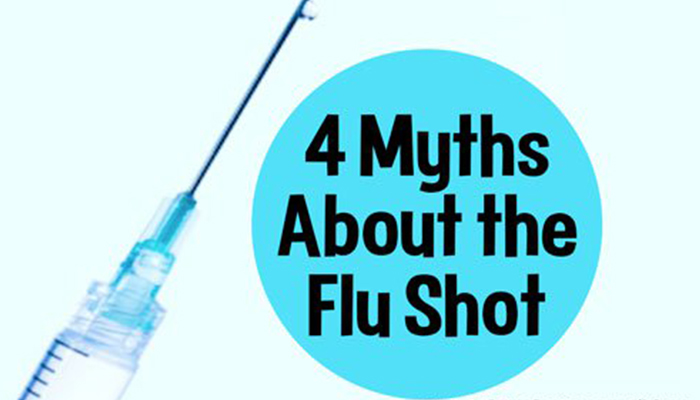With the start of the school year this means the end of summer, the start of routines and the dreaded cold and flu season. For many, this can be a worrisome time of year. I have the joy of working with many families and with the start of school I had the pleasure of seeing so many kids at their school physicals. I have also experienced the recent influx of illness with the start of school which has brought on a lot of questions about “what can we do to have a healthier year this year?” This along with the questions we commonly hear throughout cold and flu season prompted a discussion about dispelling myths regarding the influenza vaccine.
Myth #1: You can get the flu from the flu shot
FACT: The vaccine strain found in the flu shot is no longer active, so you cannot catch the flu from the flu shot. The shot can cause soreness at the injection site, some swelling, mild fever, slight head or muscles aches. These side effects from the injection are mild in comparison to the influenza illness.
Myth #2: You can only get the flu once per season
FACT: There are different types of influenza (A and B) with each having different stains. So even if you have had the flu early in the season you will still benefit from the flu vaccine to protect you against the different strains over the long flu season that lasts from October – March most years, longer some years.
Myth #3: I never get the flu, so I do not need the shot
FACT: There is no guarantee that because you have never gotten the flu in the past you will not get it in the future. What I have found for those that do get the flu during an unvaccinated year, they become a vaccinator of the flu the following year. An additional benefit to getting the flu vaccine is decreased risk for transmission of the flu to the loved ones in your life that may not be able to get the flu shot or are at increased risk of influenza (persons over 65 years of age and under 2 years of age). I am also encouraging all family members of those that recently welcomed a baby to their home to protect the baby (under 6 months of age children cannot receive the flu vaccine and are often hospitalized if they contract flu).
Myth #4: The shot does not work
FACT: Studies have proven that getting the flu vaccine reduce the risk of catching the flu in upwards of 60%. Although not perfect, it has also proven to shorten the duration of illness, reduce transmission and hospitalization. Not to mention that it’s been proven to save the lives of our children!!
I feel confident in saying: We all know that vaccines are not fun for our kids, but we do know that they help to keep them healthy. So when is the best time to get the flu shot? By the end of October is optimal, because it takes 2 weeks for the vaccine to take effect in the body.
Here is to a healthier cold and flu season for 2019-2020!



